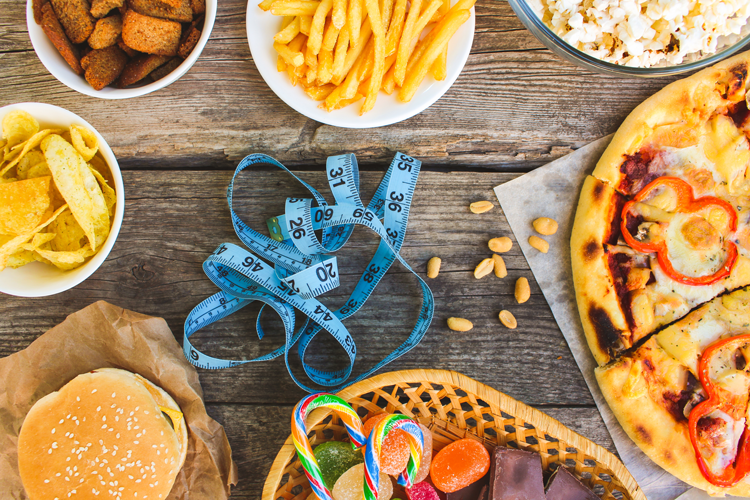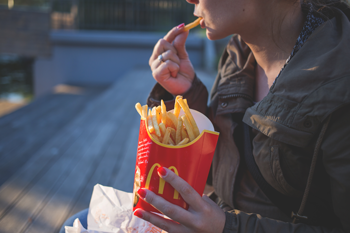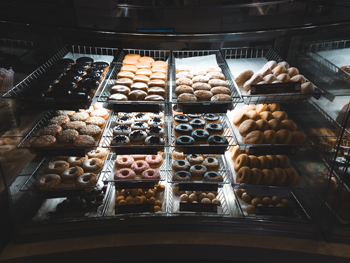8 Scientifically-Proven Reasons Why We Overeat (and How to Stop)
Nov 18, 2019

It wasn’t so very long ago that eating wasn’t something that consumed our thoughts day in and day out.
Yes, mealtimes in early, colonial America were often a time for families and friends to gather, enjoy one another’s company and celebrate. But they were just as often a simple necessity to gain sustenance and the energy to carry out daily tasks.
Why, then, has food morphed into an obsession that has long ago passed the point of enjoyability, and instead turned into a problem? Why do we overeat? Why can’t we stop ourselves from chowing down junk food? Why are we so driven by our next meal?
Here are 8 reasons, backed by science, that show why we often consume copious, unhealthy amounts of food — and ways to solve each issue.
 1) We can’t remember what (or how much) we ate.
1) We can’t remember what (or how much) we ate.
It’s natural to trust our instincts, to believe that we naturally adjust later in the week for those days when we eat, say, a bag of potato chips instead of a serving of vegetables. But the truth is, we don’t. A 1998 study found that subjects couldn’t actually remember what or when they’d eaten, and, as a consequence, ate anything placed in front of them, rather than stopping because they were full. Subsequent studies have found similar phenomenons.
How to fix it:
There’s a few different options to remembering what we put in our bodies, such as keeping a food diary and putting our meals on a regular schedule, but it really boils down to one thing: Eat mindfully. That means chewing slowly, thinking about what the food smells and looks like and tasting every bite.

2) We watch TV while we eat.
It seems harmless enough: Parking ourselves in front of the tube during dinner. Unfortunately, that couldn’t be further from the truth. Being distracted while eating a meal leads to eating more during the meal. Period. Those were the results of a 2013 study that also showed subjects who paid attention while eating ate less and lost weight.
How to fix it:
Make a commitment to turning off the TV and sitting down at the table during meal time. It will slow you down and help you attention to what you’re putting into your body — and it will quickly make the food more enjoyable, too.
3) We use massive plates.
Who knew that something so simple could make such a big impact, but it’s true: Big plates mean bigger portions and more food than is necessary. Research shows that larger plates make a serving seem smaller (causing us to pile more on it), while smaller plates make portions seem larger (making it more likely we’ll eat the proper amount).
How to fix it:
You can use dishes to your advantage by manipulating your mind to eating larger portion sizes of certain foods and smaller portion sizes of others. For example, use large plates to eat fruits and vegetables and smaller plates for whole grains and proteins.
4) We associate more food with power.
Size is something we subconsciously associate with being better — bigger homes, bigger bank accounts, bigger TV screen sizes, you name it. And, believe it or not, that same mindset applies to food, too. One study found that subjects naturally associated people who ordered a larger coffee size as being more prestigious, even when the price was the same.
How to fix it:
Awareness is the biggest part of the battle. Just by understanding your natural tendencies to associate size with status, you can combat the likelihood that you’ll eat more.

5) Junk food can be addicting.
Multiple studies have shown that foods with high sugars, saturated fats and sodium trigger chemical reactions in our brains similar to those experienced taking drugs. That means that the more of it we eat, the more difficult it becomes to stop eating it — the very definition of addiction. To top it off, a 2014 study found that not only does junk food cause weight gain, but it also reduces our desire to eat new and healthy foods.
How to fix it:
Similar to beating an addiction, cutting out the junk food takes commitment, support and persistence. But it can be done. Diet-to-Go makes it easy by providing healthy, pre-made meals that are already controlled for nutritional content. Stick with those, and you’ll find those cravings steadily dissipate.

6) We treat food as a reward.
Think back to your childhood. How many times did your parents offer you a sweet treat for doing something well or to soothe you after a difficult experience? Using food, especially sweets, as a reward is something most of us have spent our lives doing. The problem is that we tend to reward ourselves too often, which in turn leads to us forming a habit of eating certain foods, which then turns into those daily sweet treats becoming the norm.
How to fix it:
Food should never, ever be considered a reward. The key is to change your philosophy and find other things to celebrate an accomplishment. Massages, new clothes, vacations, even a something as simple as taking a selfie are all great ways to reward yourself instead.
7) We keep bad foods readily on-hand.
Our kitchen cupboards are typically packed to the gills with food — canned food, boxed food, bagged food. The problem is, more often than not, many of those foods are junk foods. They’re right there, ready for us to grab and munch on at all times. How can we possibly avoid eating them?
How to fix it:
You’re heard the whole “out of sight, out of mind” mantra, right? There’s a reason it’s so popular. It really works. Purge your kitchen of all the unhealthy snacks and avoid buying them at the grocery store. Just by not having them handy, you’ll find you can stop eating them easier.
.png)
8) We’re tired and stressed.
A lack of sleep and feeling anxious all the time have both been shown to up the likelihood we’ll eat too much. Multiple studies have shown that both tiredness and stress can cause weight gain and make it more difficult to lose weight as our bodies chemically react and our brains are less able to fight off cravings.
How to fix it:
The two go hand-in-hand. Sleep better, and you’ll likely be able to handle stress easier. Feel less stressed, and you’ll likely sleep better. Pick one to conquer first, and managing the other will likely follow suit.
What reasons do you have for eating too much? How have you overcome them? Share in the comments below!
------------------------------------------------------------------------------------Author: Caitlin H
Diet-to-Go Community Manager
Caitlin is the Diet-to-Go community manager and an avid runner. She is passionate about engaging with others online and maintaining a healthy, active lifestyle. She believes moderation is key, and people will have the most weight loss success if they engage in common-sense healthy eating and fitness.










